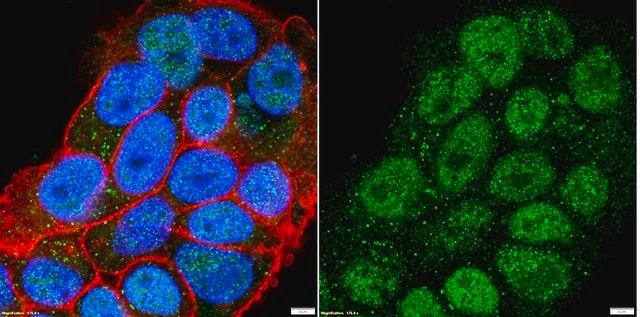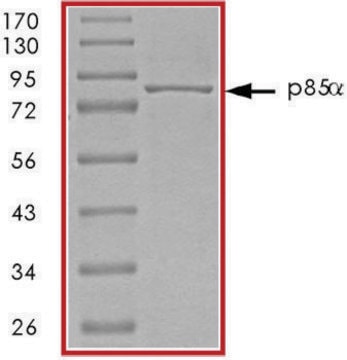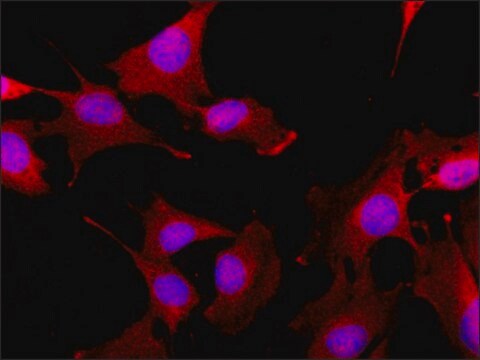05-824
Anti-Estrogen Receptor β Antibody, clone 68-4, rabbit monoclonal
clone 68-4, Upstate®, from rabbit
Sign Into View Organizational & Contract Pricing
All Photos(1)
About This Item
UNSPSC Code:
12352203
eCl@ss:
32160702
NACRES:
NA.41
Recommended Products
biological source
rabbit
Quality Level
antibody form
purified immunoglobulin
antibody product type
primary antibodies
clone
68-4, monoclonal
species reactivity
human
packaging
antibody small pack of 25 μL
manufacturer/tradename
Upstate®
technique(s)
immunoprecipitation (IP): suitable
western blot: suitable
isotype
IgG
NCBI accession no.
UniProt accession no.
shipped in
ambient
target post-translational modification
unmodified
Gene Information
human ... ESR2(2100)
General description
Estrogen receptors (ER) are members of the steroid/thyroid hormone receptor superfamily of ligand-activated transcription factors. Estrogen receptors, including ERα and ERβ, contain DNA binding and ligand binding domains and are critically involved in regulating the normal function of reproductive tissues. They are located in the nucleus, though some estrogen receptors associate with the cell surface membrane and can be rapidly activated by exposure of cells to estrogen. ERα and ERβ have been shown to be differentially activated by various ligands. Receptor-ligand interactions trigger a cascade of events, including dissociation from heat shock proteins, receptor dimerization, phosphorylation and the association of the hormone activated receptor with specific regulatory elements in target genes. Evidence suggests that ERα and ERβ may be regulated by distinct mechanisms even though they share many functional characteristics.
Produced in collaboration with Epitomics
Specificity
Predicted to cross-react with rat and mouse based on sequence homology
Recognizes Estrogen Receptor β, long form, does not detect estrogen receptor alpha.
Immunogen
KLH-conjugated linear peptide corresponding to amino acids 108-127 from the N-terminal half of human estrogen receptor beta.
Application
Detect Estrogen Receptor β also known as Nuclear receptor subfamily 3 group A member 2 with Anti-Estrogen Receptor β Antibody, clone 68-4 (Rabbit Monoclonal Antibody), that has been demonstrated to work in IP & WB.
Research Category
Epigenetics & Nuclear Function
Epigenetics & Nuclear Function
Research Sub Category
Transcription Factors
Transcription Factors
Quality
routinely evaluated by immunoblot on RIPA lysates from MCF7 cells
Target description
59 kDa
Physical form
Format: Purified
Protein A Purified immunoglobulin in 0.1M Tris-Glycine, 0.15M NaCl and 0.05% sodium azide, pH 7.4.
Protein A purified
Storage and Stability
Stable for 1 year at 2-8°C from date of receipt.
Analysis Note
Control
MCF7 cell extracts
MCF7 cell extracts
Other Notes
Concentration: Please refer to the Certificate of Analysis for the lot-specific concentration.
Legal Information
UPSTATE is a registered trademark of Merck KGaA, Darmstadt, Germany
Disclaimer
Unless otherwise stated in our catalog or other company documentation accompanying the product(s), our products are intended for research use only and are not to be used for any other purpose, which includes but is not limited to, unauthorized commercial uses, in vitro diagnostic uses, ex vivo or in vivo therapeutic uses or any type of consumption or application to humans or animals.
Not finding the right product?
Try our Product Selector Tool.
Storage Class Code
10 - Combustible liquids
WGK
WGK 1
Certificates of Analysis (COA)
Search for Certificates of Analysis (COA) by entering the products Lot/Batch Number. Lot and Batch Numbers can be found on a product’s label following the words ‘Lot’ or ‘Batch’.
Already Own This Product?
Find documentation for the products that you have recently purchased in the Document Library.
Up-regulation of estrogen receptor-beta expression during osteogenic differentiation of human periodontal ligament cells.
X Tang, H Meng, J Han, L Zhang, J Hou, F Zhang
Journal of Periodontal Research null
Estrogen and cytochrome P450 1B1 contribute to both early- and late-stage head and neck carcinogenesis.
Shatalova, EG; Klein-Szanto, AJ; Devarajan, K; Cukierman, E; Clapper, ML
Cancer Prevention Research (Philadelphia, Pa.) null
M A Karim Rumi et al.
Endocrinology, 158(7), 2330-2343 (2017-05-19)
Estrogens are essential hormones for the regulation of fertility. Cellular responses to estrogens are mediated by estrogen receptor α (ESR1) and estrogen receptor β (ESR2). In mouse and rat models, disruption of Esr1 causes infertility in both males and females.
Guangfeng Zhang et al.
Molecular endocrinology (Baltimore, Md.), 24(9), 1737-1747 (2010-07-28)
Recent studies have demonstrated the presence of estrogen receptor (ER)beta in the mitochondria in various cell types and tissues, but the exact function of this localization remains unclear. In this study, we have examined the function of mitochondrial ERbeta in
Yan Zhu et al.
Science (New York, N.Y.), 295(5554), 505-508 (2002-01-19)
Blood vessels express estrogen receptors, but their role in cardiovascular physiology is not well understood. We show that vascular smooth muscle cells and blood vessels from estrogen receptor beta (ERbeta)-deficient mice exhibit multiple functional abnormalities. In wild-type mouse blood vessels
Our team of scientists has experience in all areas of research including Life Science, Material Science, Chemical Synthesis, Chromatography, Analytical and many others.
Contact Technical Service








